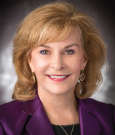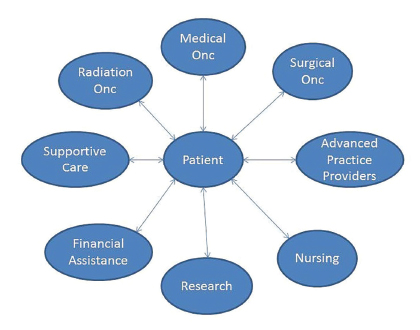In 1964, when the first seven physicians who founded ASCO met, I doubt they imagined what a successful Society they were forming. At that time, cancer treatments were just beginning to have some early successes with a few cytotoxic therapies, new radiation modalities, and improved surgical techniques.
Over the ensuing 50 years, the advancements in cancer care and research have been extraordinary. Fast forward to 2015—ASCO has over 35,000 members from over 120 countries, and the ASCO Annual Meeting in Chicago has in excess of 37,000 attendees. Our founders would be so proud of what ASCO provides in education, information, support, mentorship, and research funding.
I am very honored to be the 52nd President of ASCO and to represent our membership. I chose the theme of Collective Wisdom: Patient-Centered Care and Research to represent the importance of the multimodality care that is necessary for our patients. As this figure demonstrates (Fig. 1), patients are at the center of a very complex system trying to assist them through their journey of cancer care.
Today, the ability to deliver the optimum care to our patients is becoming ever-more challenging. We have so many more options for treatment than in years past, but the ability to provide the therapies is sometimes met with obstacles. The availability and affordability of the new therapies vary by country and health-care system. As the health-care systems change from a reimbursement-based system to a value-based system, we must continue to modify our models of care. Clinical research must also include a component of cost-effectiveness in studies to help physicians and patients make informed decisions. However, we must always remember that the patient is the center of the circle, and the goal is to assist him or her in informed decision-making.
The multidisciplinary aspects of cancer care and research continue to be very important with advances in the understanding of the biology and genomics of different malignancies. This emphasizes the importance of education and communication between the team members on a regular basis.
In addition, as we make improvements in cancer care, there will be many more cancer survivors who will need medical and supportive care to get beyond cancer treatment and back to a normal life. A medical team that, by necessity, is much broader than an oncology team will carry much of this care out.
All of the improvements made in cancer care over the past decades depended on the clinical and research data gathered and analyzed to improve future care. To continue to make advances, we must find ways to streamline and efficiently use the data gathered from all patients to inform our treatment patterns. Clinical trials will need to be optimized and a broader range of data on all patients will need to be obtained and analyzed.
Over the next year, the issues that I and the ASCO leadership will be addressing include value-based care models; workforce-shortage issues; clinical cancer research best practices and optimization; big data analysis through CancerLinQ; quality measures through the Quality Oncology Practice Initiative (QOPI); and improvement in care delivery globally. As medical professionals and as a Society, we must all continue to evolve and transform cancer care and research with each new discovery.
We can only hope that 50 years from now, future medical professionals who care for patients with cancer and who perform cancer research can look back and thank us for the pioneering aspects of treatments that were developed in our era. ■
Originally printed in ASCO Connection. © American Society of Clinical Oncology. “Collective Wisdom: Patient-Centered Care and Research.” https://connection.asco.org/commentary/collective-wisdom-patient-centered-care-and-research. All rights reserved.



